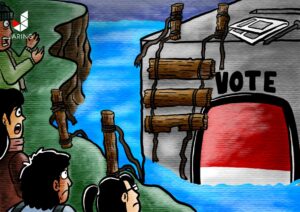The discourse on extending the term of office of village heads to nine years by revising the Village Law is considered a vested political interest as the 2024 General Election is approaching. The revision of the law is seen as a hidden agenda that is full of political interests, thus vulnerable to being politicized. Moreover, the number of nationwide villages that currently reaches more than 83,800 villages is quite promising for regional and national politicians.
Demands to extend village heads’ tenure came to public attention when groups of village heads rallied in front of the House of Representatives (DPR) Building in Jakarta in mid-January 2023. They claimed that the six-year term was too short to improve the village. Moreover, the early years of the village head leadership are often marred by friction after the elections.
A number of politicians welcomed the demand of extending the village heads’ tenure to nine years. Even the Minister of Village Development of Disadvantaged Regions, Abdul Halim Iskandar, has agreed with the idea.
However, according to the Executive Director of the Regional Autonomy Implementation Monitoring Committee (KPPOD), Armand Suparman, the revision of the Village Law should not be focused on extending the term of office of the village head. Instead, the initiative should emphasize improving village development governance, from planning, and budgeting, to development implementation. In an exclusive interview with Jaring.id, Armand expressed his concern that if improvements to village development governance are not made, the revision of the Village Law will be counterproductive to village democracy. The following is an excerpt from the interview:
How do you see the demands to revise the Village Law?
First, this discourse emerged last year, initiated by the Association of Village Heads and Village Apparatus. From my perspective, this can be full of vested political interest. In terms of urgency, I think the revision of the Village Law is not considered as urgent and crucial at the moment. Revising the Village Law now can cause negative impacts on the substances and it might be exploited for certain political interests. So, if the law is to be revised, it is better to wait for two or three years after the situation has returned to normal, without any political heat whatsoever. This means the right time for the revision is after the elections and presidential election end.
Why do you think they insist to speed up the process of revising the Village Law in this political year?
The number of villages, which reaches 70,000 throughout Indonesia, is certainly an extraordinary political force. This can be used by politicians at the district, provincial, or national levels. This is something that eventually became our concern. If the law is revised this year, it is prone to being used for political purposes. And if it is really for political interest, then it will likely be done as quickly as possible. This is exactly what happens in the revision of the Village Law.
The extension of the term of office of village heads allegedly comes from Central and East Java, which are the bases of PDIP and PKB. Recently, some village heads in these areas also declared their open support for Ganjar Pranowo’s candidacy. Isn’t this a form of transactional politics?
Therefore, this move is perceived as political capital collected from village heads and officials. Their support can be used and capitalized on for certain political interests. So, it is very transactional. With the demands of village heads who want to increase their tenure, it means that politicians can grant the demands of village heads and use them to promote the interests of certain political parties.
Is it okay for village heads and officials to participate in practical politics?
In fact, if someone is still serving as a village head, he or she should not be a partisan of a political party, as this could have an impact on the quality of public services.
Will it cause an unhealthy political situation?
We are more focused on the quality of policy governance. Do not let the revision of the Village Law ignore the substance of the policy just because this is a political year and because of the pressure from certain groups. The Village Law is an extraordinary law, which places all elements in the village as the subject of development. So, do not let the revision discussion process obscure the village’s position in development, both at the village level and national development. If the revision of the Village Law is carried out in the period before this election, we are worried that it could jeopardize its substance.
Are the claims saying that “village problems can be solved by extending the term of office” true?
We actually look at the four pillars of the process: environment, social, economy, and governance, and these can be seen in the Village Development Index (IDM) issued by the Ministry of Villages every year. Of all these, the most decisive is governance, because it is a matter of planning, the quality of budgeting, and the quality of policy services. This is the most determining factor, instead of the term of office. The term of office is not a crucial factor in good village governance. So, the discussion of revising the law to extend the tenure period is a far-fetched discourse that is being used for the sake of political interests.
What is the current situation of village governance and what do you think should be evaluated?
First, if we start from the context of the number of village heads involved in corruption cases, it means that there is something wrong in the entire planning process. When we see it from the perspective of good governance; participatory, accountable, and transparent, we can say that the most important thing to consider in the revision of the Village Law is whether the derivative regulations guarantee the principles of transparency, participation, and accountability.
Then, if we look at the structure and institutions of the village, there is one other element that must be emphasized, which is the Village Consultative Body (BPD). The BPD is supposed to be a counterweight to, and supervise, the village head. However, in practice, the BPD becomes the “subordinate” of the village head on a daily basis. This is because the village head plays a big role in the selection process of the BPD. This should be addressed in the revision process. And we see that the term of office is not even a major factor that determines the quality of governance.
Does that mean that it is enough for the village head to serve for 6 years?
The 6-year term of office for a village head is sufficient. If the village head has satisfactory work indicators, and the village community believes in his performance, he can be trusted again to lead the village for another 6 years, and can even serve up to 18 years or three periods.






